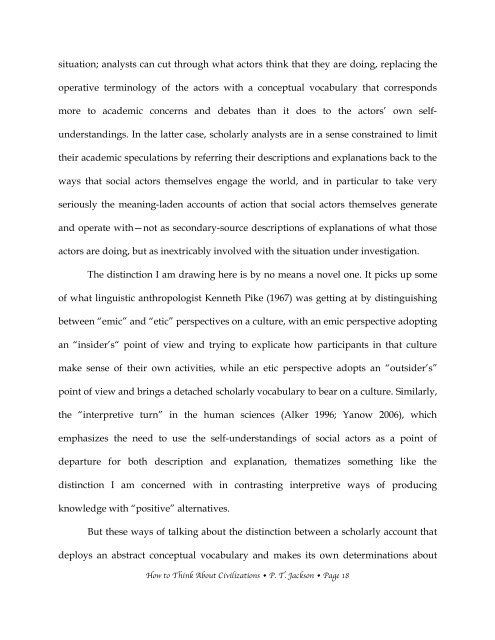How to Think About Civilizations - The Watson Institute for ...
How to Think About Civilizations - The Watson Institute for ...
How to Think About Civilizations - The Watson Institute for ...
Create successful ePaper yourself
Turn your PDF publications into a flip-book with our unique Google optimized e-Paper software.
situation; analysts can cut through what ac<strong>to</strong>rs think that they are doing, replacing the<br />
operative terminology of the ac<strong>to</strong>rs with a conceptual vocabulary that corresponds<br />
more <strong>to</strong> academic concerns and debates than it does <strong>to</strong> the ac<strong>to</strong>rs’ own selfunderstandings.<br />
In the latter case, scholarly analysts are in a sense constrained <strong>to</strong> limit<br />
their academic speculations by referring their descriptions and explanations back <strong>to</strong> the<br />
ways that social ac<strong>to</strong>rs themselves engage the world, and in particular <strong>to</strong> take very<br />
seriously the meaning-laden accounts of action that social ac<strong>to</strong>rs themselves generate<br />
and operate with—not as secondary-source descriptions of explanations of what those<br />
ac<strong>to</strong>rs are doing, but as inextricably involved with the situation under investigation.<br />
<strong>The</strong> distinction I am drawing here is by no means a novel one. It picks up some<br />
of what linguistic anthropologist Kenneth Pike (1967) was getting at by distinguishing<br />
between “emic” and “etic” perspectives on a culture, with an emic perspective adopting<br />
an “insider’s“ point of view and trying <strong>to</strong> explicate how participants in that culture<br />
make sense of their own activities, while an etic perspective adopts an “outsider’s”<br />
point of view and brings a detached scholarly vocabulary <strong>to</strong> bear on a culture. Similarly,<br />
the “interpretive turn” in the human sciences (Alker 1996; Yanow 2006), which<br />
emphasizes the need <strong>to</strong> use the self-understandings of social ac<strong>to</strong>rs as a point of<br />
departure <strong>for</strong> both description and explanation, thematizes something like the<br />
distinction I am concerned with in contrasting interpretive ways of producing<br />
knowledge with “positive” alternatives.<br />
But these ways of talking about the distinction between a scholarly account that<br />
deploys an abstract conceptual vocabulary and makes its own determinations about<br />
<strong>How</strong> <strong>to</strong> <strong>Think</strong> <strong>About</strong> <strong>Civilizations</strong> • P. T. Jackson • Page 18
















